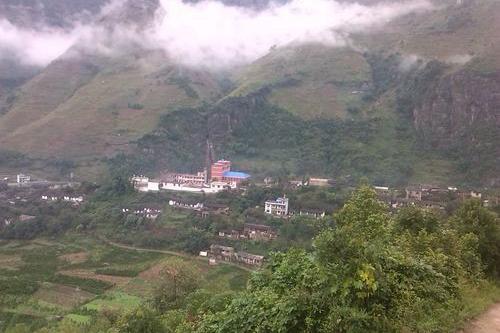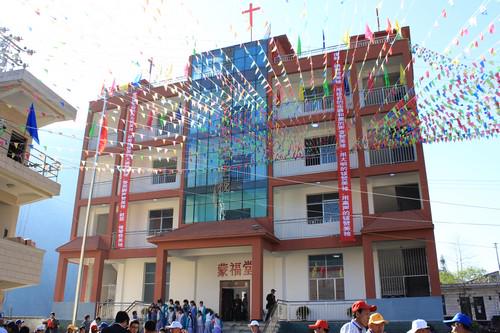Fugong Bible School in Nujiang Prefecture, Yunnan Province recently held a commencement with 103 theological students graduating. Four of the students came from Lanping County while the rest are from Fugong County. Most of them will return to local churches to serve with new challenges awaiting them.
Situated in Guquan Village, Shangpa Township, Fugong County, and first built in 1993, Fugong Bible School covers an area of 5,560 acres of land. Mengfu (Blessed) Church was renovated in June 2012 with 1.5 million yuan(220,900 USD) of investment. It held the dedication ceremony on February 24, 2013 to mark its completion.
The 14 courses of the Bible School last 10 months, mostly based in knowledge of the Christian faith. There are also courses on Policy and Regulations, Anti-cults, Anti-drug, Medical and Food Hygiene, etc. according to Di Youtang, chairman of the local CCC/TSPM.
Graduates who were recommended by churches will resume working in their churches. Others will go home for farming, seek jobs in other cities, or continue theological studies in other places.
The school also loses graduates due to livelihood problems. However, 90% of them still go back to serve in their local churches and are supported by their families, according to Di.
"We value the spiritual growth of preachers. Therefore they're perfectly happy in their service. Moreover, our brothers and sisters respect them that their serving is sacred. While male preachers can't possibly live without the support of their wives."
Since churches in Fugong are mostly in a mountainous area, they're very different from urban churches. Those who oversee churches with many believers basically have no time to take care of their families. Other than preaching, they also help believers with weddings, funerals, etc. They visit believers' homes when they're sick and pray for them. However, most theological students only learn knowledge from books at school and lack experience in other aspects. They can only preach sermons and therefore they inevitably face great challenges.
Teacher Ni from the school once told CCD that students bring their own food and live at the school. They don't pay tuition but living costs to the school, and students and teachers live together. With ages ranging from 18-50 and training at the Bible School, it can mostly meet the local pastoral needs.
Brother Yang was among the first graduates in the Bible School between 2002 and 2005. Back then they had intensive study for three months every year. 40 out of 50 students graduated. He recalled that at only 17 he chose to go to Bible School because he wanted to understand the Word of God, and not that he had any burden for the church. In addition, his faith was deeply influenced by his grandfather.
"My grandfather learned from British missionary Allyn Cooke when he was young. Though he stumbled during the sensitive period, he got back up to serve God all his life. I never heard him swearing or judging people behind their backs for as long as I could remember. He preached a lot about love, so when people talked about him in the church, they called him 'preacher of love.' He died at 85 and I didn't see him near the end since I was studying in seminary."
Back then the school taught "Life of Jesus," "Overview of the Old Testament," "Basic of Homiletics," "Church Worker Training Manual," and so on, said Yang. There were only two teachers, but by the time he graduated there was a new teacher. The 40 graduates almost all went back to serve in their churches. He continued his study in Yunnan Theological Seminary and gradually learned the urgent need to preach the Gospel. He then led his parents to constantly alter their faith. Brother Yang grew from a traditional Christian to a Christian with good faith that truly understood salvation. "Though there are many believers in Fugong, it doesn't mean spreading the Gospel is no longer necessary. Believers need to have a constant update in truth." Seeing this, he chose to return to his hometown church to serve.
He recalled that transportation was very inconvenient back then. There were no roads in the villages and the path to school was a dirt road. There was not even one car in Fugong CCC/TSPM. "Students carried firewood, food, vegetables, and rice in their bamboo backpacks to school. Our classroom was on the first floor with crowded limited space. No fan was available in hot summers. We ate mostly potatoes. 'Our life is full of potatoes,' a classmate joked with me."
Compared with the past, the current condition of the Bible School is much better, said Yang. He works in the translation team of the local CCC/TSPM. By translating teaching materials into the Lisu language for the Bible School, the teaching can also be improved. He hopes that the school could provide bedding and other living supplies for the students that come from mountainous areas so that they don't have to mail them from home.
The local economy is relatively backward due to its location in a high altitude mountainous area. With the shortage of funds and knowledge to carry out educational activities they can't afford to hire teachers from other places. Local teachers mostly teach in the Lisu language, and there is hardly anyone that teaches in Mandarin.
The Bible School is indeed facing many challenges; however, they're planning to make it better, according to Di. For example, they're planning the construction of a dining hall and kitchen. They will also enroll more students and divide them into Mandarin and Lisu classes. Moreover, the unsafe house in the school will be demolished. Teachers' salaries and welfare will be improved so that they can lead a better life.
Teacher Ni began studying in Yunnan Theological Seminary in 2002. Concerning the development of Fugong churches, she came back to her hometown after graduation and worked as a full-time teacher for four years. Soon after that she started working in the county's CCC/TSPM. She hopes to nourish more young people to serve God loyally.
"Nowadays very few young people are willing to bear hardships to serve God in this mountainous area. Most of them go to other cities to work because of the stress of life. This needs our mutual work," she said.
The Gospel was introduced to Fugong by missionaries. The local believer percentage is very high; 70% of the 100,000 general population Christian, and as high as 90% in rural areas. There is one church in almost every village with 5-6 clergymen. One of them preaches and the others provide for the service. Churches in Fugong require that all preachers must receive training before they can preach or they are not qualified.
"We have high standards for church workers. They need to have good qualities other than learning the Bible to work in the church. All workers are elected by believers every three years," Di told CCD.
-Translated by Grace Hubl













